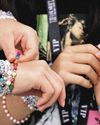
In the face of rapidly changing marine environments, one coral reef scientist is experimenting with novel ways of coral propagation that could make these habitats more resilient.
Currently, most coral reef restoration activities around the world involve collecting coral fragments from a "wild" reef and growing them in laboratories before transplanting them onto a degraded site. As the coral fragments are genetically identical to their parents, this method of restoration is also known as asexual fragmentation.
But Professor Peter Harrison from Southern Cross University, Australia, is experimenting with coral larval restoration, which produces genetically unique baby corals instead. This method will ensure corals of greater genetic diversity, which will confer more resilience in the face of marine heatwaves and other threats.
The marine ecologist said that while asexual fragmentation is often adopted by non-governmental organisations to help people understand why corals are important to reef ecosystems, it is inadequate for coral reef restoration and has been overwhelmed by the scale and rate of reef destruction.
"Typically (these corals) have limited genetic diversity and therefore low resilience to things such as bleaching impacts. And (the) most recent modelling is showing that this approach is simply not going to be cost-effective for larger scale, kilometre-types of restoration that we need to be doing urgently now," he added.
Commonly referred to in the media as "Coral IVF (in-vitro fertilisation)", the coral larval restoration method is essentially optimising the natural cycle of coral spawning to restore damaged reef systems, and consists of five phases.
The research team first locates diverse breeding corals that have survived recent bleaching events, which indicates that they could be more heat-tolerant than those that did not survive.
Diese Geschichte stammt aus der November 18, 2024-Ausgabe von The Straits Times.
Starten Sie Ihre 7-tägige kostenlose Testversion von Magzter GOLD, um auf Tausende kuratierte Premium-Storys sowie über 8.000 Zeitschriften und Zeitungen zuzugreifen.
Bereits Abonnent ? Anmelden
Diese Geschichte stammt aus der November 18, 2024-Ausgabe von The Straits Times.
Starten Sie Ihre 7-tägige kostenlose Testversion von Magzter GOLD, um auf Tausende kuratierte Premium-Storys sowie über 8.000 Zeitschriften und Zeitungen zuzugreifen.
Bereits Abonnent? Anmelden

Rising mercury shifts seasons
The year 2023 was recorded as the hottest in history, and 2024 is on track to surpass it.

Pasta gets artisanal
The hunger for artisanal pizza is eternal in Singapore. But in 2024, the spotlight shone on another well-loved carb: pasta.

Low and No' drinks for the health-conscious
In 2024, a year-long trend emerged from Dry January, with health-conscious consumers increasingly opting for low- or no-sugar, salt, alcohol, carb, and caffeine drinks, prompting restaurants and beverage brands to adapt.

Ozempic, the 'superstar' diabetes drug
In 2024, Ozempic gained global attention as a ground-breaking treatment not just for Type 2 diabetes but also weight management, leading to widespread demand and media coverage.

K-pop's catastrophic year
2024 has largely been a scandal-ridden and unsavory year for K-pop, involving some of the biggest stars and agencies.
Nanyang coffee nostalgia
Traditional coffee from South-east Asia, also known as Nanyang coffee, was on an uptrend in 2024, stirring interest among young consumers with snazzy iterations such as Great Nanyang Heritage Cafe's Coconut Coffee and Soymilk Coffee.

Menopause awareness on the rise in S'pore
2024 marked the year more Singapore women broke the silence surrounding menopause.

Jitter sparks discourse about stereotypes
Singaporean Marvel character Sofia Yong, or Jitter, garnered plenty of online discussion after the announcement of her character on Aug 9.

Gen Z and Alpha's meme-infused vocabulary
\"Time changes all things; there is no reason why language should escape this universal law,\" wrote 19th-century Swiss linguist Ferdinand de Saussure.

Friendship bracelets and The Eras Tour
Hotels, restaurants and other hospitality providers are the typical beneficiaries of concert tourism. But another retail player experienced an unexpected boost from American pop star Taylor Swift's The Eras Tour concerts in Singapore in March: the humble bead shop.